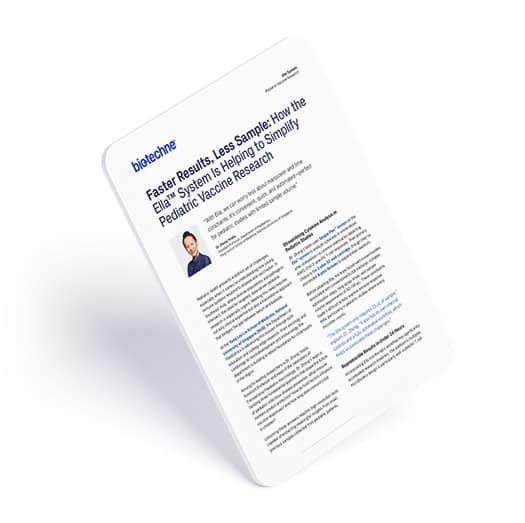Fast and Efficient: How the Ella™ System Is Helping to Simplify Pediatric Vaccine Research
"With Ella, we can worry less about manpower and time constraints. It’s convenient, quick, and automated—perfect for pediatric studies with limited sample volume."
- Dr. Zhong Youjia, Assistant Professor, Department of Paediatrics, Yong Loo Lin School of Medicine, National University of Singapore
Pediatric health presents a distinct set of challenges, especially when it comes to understanding how young immune systems respond to disease and vaccination. In Southeast Asia, where diverse populations and pathogens intersect, the need for targeted, data-driven pediatric research is especially urgent. Meeting this need requires not only clinical expertise but also a translational approach that bridges the gap between bench and bedside.
At the Yong Loo Lin School of Medicine, National University of Singapore (NUS), the Department of Paediatrics is advancing this mission through both education and cutting-edge research. From oncology and cardiology to neurodevelopment and immunology, the department is building a robust foundation for child health in the region.

Among its leading researchers is Dr. Zhong Youjia, Assistant Professor and head of the Laboratory of Translational Paediatric Vaccinology. Dr. Zhong’s team is tackling three fundamental questions that shape the future of pediatric infectious disease prevention: What immune markers predict protection? How do host factors influence vaccine responses? And how long does immunity last in children? Unlocking these answers requires high-resolution tools capable of extracting meaningful insights from small, precious samples collected from pediatric patients.
Streamlining Cytokine Analysis in Pediatric Studies
Dr. Zhong’s team uses Simple Plex™ assays on the Ella™ system to analyze cytokines in whole blood after stimulation—a common method for detecting SARS-CoV-2-specific T cell responses. Their primary choice is the 2-plex 32-well cartridge, though they’ve also tested 8-plex formats to expand their readouts.
Before adopting Ella, the team faced well-known hurdles associated with conventional ELISA methods: complex optimization steps, long assay times, and sample volume requirements of 50–100 µL. These constraints made it difficult to fully explore immune response data, particularly in pediatric studies where every microliter counts.
“The Ella system only requires 25 µL of sample,” explains Dr. Zhong. “It also has its own internal controls and a fully automated workflow, which helps us overcome these challenges.”
Reproducible Results in Under 24 Hours
Incorporating Ella into the lab’s workflow has significantly accelerated research timelines. The platform’s multiplex microfluidics design is particularly well-suited for T cell assays, which are typically time-consuming and resource intensive.
With Simple Plex assays, we can deliver accurate, reproducible data in less than 24 hours, says Dr. Zhong. That's helped us streamline data collection and reduce pressure on lab personnel.
This efficiency has already contributed to a high-profile publication in Nature Medicine, titled “Correlates of protection against symptomatic SARS-CoV-2 in vaccinated children.” In this study, the Ella system played a key role in helping the researchers identify cytokine signatures linked to vaccine-induced protection—critical information for guiding future pediatric vaccination strategies.
Laying the Groundwork for Clinical Innovation
With these tools in place, Dr. Zhong’s team is now exploring how the Ella system could be used to develop a clinical-grade diagnostic assay for measuring cytokines in pediatric samples.
“As we continue to investigate how children respond to vaccines, platforms like Ella give us the flexibility, speed, and precision we need,” says Dr. Zhong. “It’s helping us answer some of the most important questions in pediatric vaccinology.”